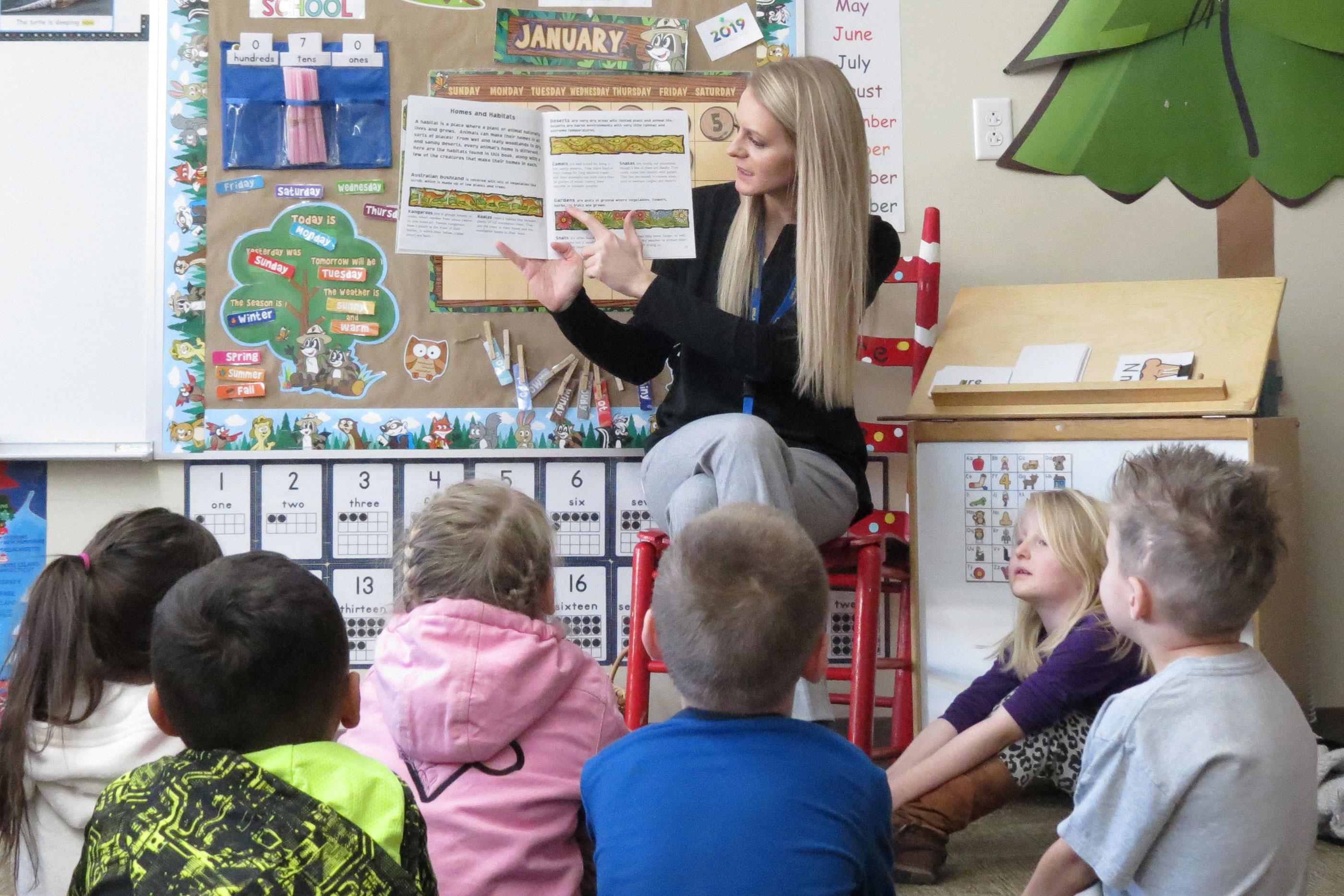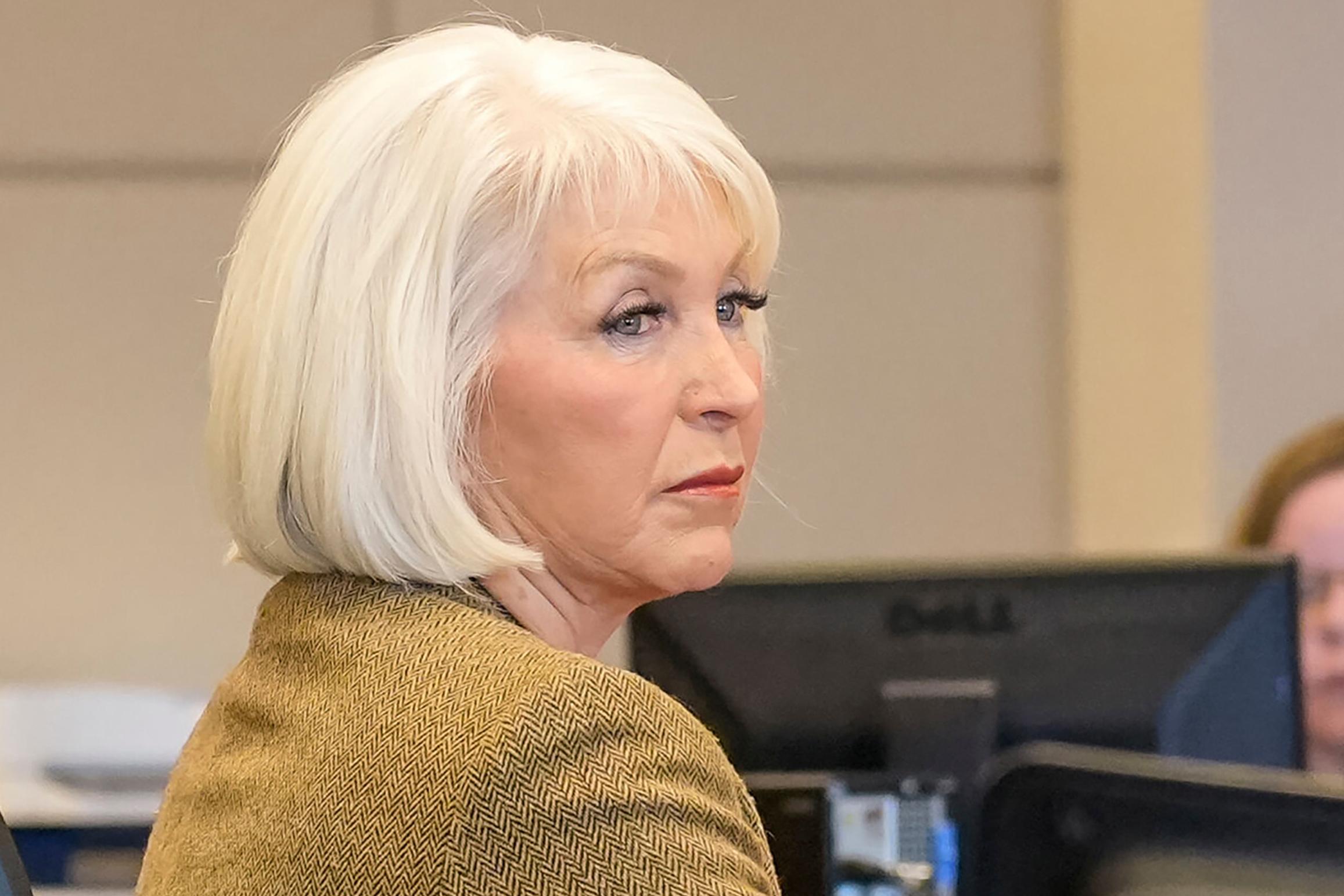

To the 5-year-olds in kindergarten teacher Holly Koehn’s classroom at Simla Elementary School in rural Elbert County, it’s a no-brainer if you ask them what kindergarten has taught them.
“Something special about kindergarten is learning and being honest.”
“Making your teachers happy,” said another.
“Being nice and kind, being respectful to others, and reading... because it helps you learn,” several others exclaimed.
Students in the Big Sandy school district are among the 13,000 children in Colorado without access to full-day kindergarten. Gov. Jared Polis has made it his top priority to give every child across the state that access.
Full-day kindergarten was a centerpiece of his election campaign, a key part of his state of the state address and his first budget priority. He even took his pitch directly to the state Capitol and the legislative bill to make it happen is expected to surface soon.
“Colorado is a picture of inequality, where some students attend free full-day kindergarten, some must pay tuition, and other families get left behind because they cannot afford the costs,” Polis said in his state of the state.
Seventy-eight percent of Colorado kindergartners attend full-day kindergarten, up from 14 percent in 2001-2002. Currently, the state only funds a half-day. Some districts cover the other half to offer a whole day of kindergarten. In other districts, an estimated 30,000 families pay for the second half of the day.
And in a few school districts, like Big Sandy Schools, home of Simla Elementary, full-day kindergarten isn’t even offered.
The governor said full-day kindergarten is a chance to prevent learning gaps that fall along racial, economic and geographic lines. The investment in kindergarten will save taxpayers money in the long run, he said. One study shows for every dollar invested in birth through five-year-old programs there are $13 in savings on expensive interventions later on.
His plan would also free up the $100 million districts spend on kindergarten right now and allow them to use that money on other priorities. And finally, the governor argued that parents have asked for it — and not for the first time.
This Isn’t Colorado’s First Full-Day K Rodeo
More than a decade ago, Colorado lawmakers promised to phase in full-day kindergarten as parents across the state demanded. The promise was to increase funding a little bit each year until it was fully funded.
Bruce Atchison, a principal with the Education Commission of the States, helped write the legislation as chief of staff for the Lt. Governor during the Ritter administration. He and his team came up with the phase-in idea to get it through the legislature.
“Within five years we would have fully funded full-day K and it wouldn’t be a huge hit on the budget and it was something that was very achievable and doable.”
The Great Recession undid all that careful work.
Big Sandy Schools Superintendent Steve Wilson, who oversees Simla Elementary, said school leaders at the time were cautious and skeptical. They’d seen money promised for things like special education dwindle to a trickle. When the downturn hit, “sure enough, the state had that phase-in thing and they never funded it,” Wilson said.
As a result, his district never paid for, nor offered, full-day kindergarten. Their time was consumed instead with maintaining achievement and retaining teachers when state lawmakers began to cut school funds in 2008. The annual deficits to public schools are still in place; the total withheld from all Colorado districts since 2008 is $7.5 billion.
Many parents in Big Sandy district are excited by Polis’ goal of fulfilling lawmakers’ earlier promise to fund full-day kindergarten. The tiny town of Simla is 638 people who live an hour’s drive east of Colorado Springs. Full-day K would be a game changer here.
Meghan Zollars, who works 12-hour shifts in Colorado Springs, has a 5-year-old daughter in half-day preschool. Her daughter’s father works overnight shifts.
“So, he only gets only 3 or 4 hours of sleep because he has to drop her off and then he has to wake up and pick her up and then obviously when she’s home he can’t sleep,” Zollars said of her daughter, Sophie.
“What are you supposed to do with your kids for half-day, especially out here, there’s not a lot of child care options,” she asked.
If lawmakers fund full-day kindergarten, Superintendent Steve Wilson said his school board will consider it. If the bill passes, and the state funds it, full-day kindergarten will still be optional for school districts, not a requirement.
“Even with only going half-day K, our students have done very well, now can they do better? Well, very possibly so,” Wilson said.
There’s A Budget Placeholder, But Reservations Remain
Top lawmakers voiced reservations about whether the state could afford full-day kindergarten.
The March 2019 economic forecast gave some lawmakers pause. While the governor’s budget office painted a rosier picture, others said the forecast indicates employment growth, consumer activity and manufacturing have slowed, while exports are down significantly. The perceived uncertainty has left some lawmakers to speak of – again — phasing in full-day kindergarten. That’s in contrast to the governor’s plan to make full-day a reality by next fall.
At the revenue forecast presentation, Republican Sen. Bob Rankin said their concerns “have a lot to do with sustainability.”
“Once we make that obligation to full-day K, we do not want to have to take it back.”
Joint budget committee cuts $10 million from some of earlier decisions to fund $185 million for full day Kindergarten. Proposal would allow all students to be funded at 1.0 level based on this year's Oct. count #coleg
Polis’ top priority got a big endorsement on Tuesday from the legislature’s joint budget committee. It voted 5 to 1 to set aside $185 million in their draft budget — about 80 percent of the $227 million the governor requested.
That’s enough to cover the anticipated increase in enrollment in full-day kindergarten, based on this year’s October count. The assumption here is that not every eligible kindergartner will enroll. Polis’ higher figure also included $26 million for implementation funds and an additional 3,000 preschool slots.
“Until we have a better sense of where we’re going to be with regards to the numbers and the budget and making sure that we’re covering all of the rest of our budget priorities, we just don’t feel like we can write the frosting on top of the cupcake,” said Sen. Rachel Zenzinger, a member of the Joint Budget Committee.
In order to come up with the $185 million, the joint budget committee had to make $10 million “haircuts” off previously approved budget allocations from the general fund from a range of departments that span higher education to public health to agriculture.
“We are in the process of whittling down the budget so that we can make an accommodation for full-day kindergarten,” Zenzinger said.
Still, the Democratic senator worries about sustaining the investment. The legislature can “certainly” fund kindergarten this year, she said, but it’s “not necessarily this year we are worried about.”
The state has other budget priorities like the $678 million shortfalls to school districts. She said that fiscal logjam prevents districts from raising teacher salaries and forced many to four day school weeks. Some lawmakers see an obligation to take on the backlog of road and highway repairs, attend to the needs of higher education or focus on other state sectors.
Gov. Polis argues the time is now. Increased local property tax revenues can relieve some pressure on state coffers, and lower forecasted growth in enrollment and inflation can cover the cost, he said. Lauren Larson, director of the Office of State Planning and Budget, told the Joint Budget Committee that long term property tax revenues are stable and not as volatile as severance, sales and income taxes.
“When they do take a downturn, they do so later than other indicators decline when there is a downturn in the economy, that’s why we think it is a good revenue source for looking at strengthening our investment in K-12,” she said.
Sen. Zenzinger wants to see what a final kindergarten bill looks like before deciding whether or not to vote for it. In the past, she’s questioned whether kindergarten deserves to go to the front of the funding line.
Advocates have a different view of history.
“We have been in line for three decades,” said Bill Jaeger of the Colorado Children’s Campaign, one of the early advocates for funding full-day kindergarten. He called the budget recommendation “a big win.”
“There is robust bipartisan support for the bill,” said Jaeger. “We seem to have a path forward and it’s just a matter of the legislature following through over course of next month.”
Polis tweeted his thanks to the committee and declared it will save money for parents and districts and give students a brighter future.
“A huge win for Colorado kids!” he wrote.
The Tuesday plan is a preliminary budget. It still has many steps and changes before it’s finalized.
School superintendents would like to see the full-day kindergarten proposal implemented, said Lisa Escárcega, the executive director of the Colorado Association of School Executives.
“We value it and we would just like to see it funded as any other student,” she said.
School districts are putting together their budgets for next year right now. They say they need an answer soon about whether money will be there – or not.









